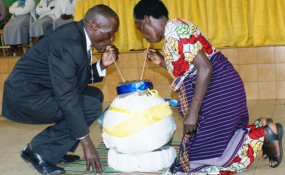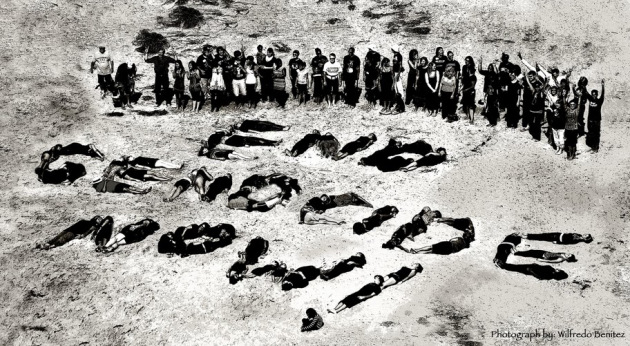
A Genocide survivor (R) shares a traditional brew with her former termentor, Aphrodis Kanani, from the same calabash after forgiving him.
photo: Frederic Byumvuhore
Ten Genocide perpetrators, including two women, who showed remorse and apologised to survivors were Sunday forgiven during a mass at Ntendezi Parish in Ruharambuga Sector, Nyamasheke District.
The ceremony was witnessed by Fidele Ndayisaba, the executive secretary of the National Unity and Reconciliation Commission (NURC), Aime Fabien Kamali, the mayor of Nyamasheke, security agencies, priests, nuns, local leaders, students from EAV Ntendezi and Christians.
The mass was organised by Ntendezi Parish under Heart Healing initiative that seeks to foster unity and reconciliation.
Shillah Nzamurambaho, the parish priest, said reconciling Genocide perpetrators and survivors in Catholic churches is an ongoing process.
He said though Gacaca courts did a great job in the reconciliation process many perpetrators are yet to get courage to approach survivors seeking forgiveness.
“As Gacaca courts concluded their work, we realised that perpetrators and survivors still have conflicts,” Nzamurambaho said.
“The Catholic Church excludes perpetrators from Holy Sacrament for six months until they ask for forgiveness from survivors. Within the six months, the Church sensitises perpetrators to tell the truth to relieve their minds and foster reconciliation. Thereafter, Church leaders visit survivors and ask them to forgive their former tormentors for unity and reconciliation purposes.”
Since the initiation of Heart Healing in 2008 at Mushaka Parish, at least 30 Genocide perpetrators have shown remorse and apologised.
The journey involves three phases; asking perpetrators to confess, encouraging survivors to forgive, and bringing together perpetrators and survivors to publically testify to reconciliation, according to Nzamurambaho, who said it was a shame for churches to have failed to keep the values of Christianity during the Genocide.
Genocide happened in churches during the day. Christians killed fellow Christians, it is crucial that Genocide perpetrators to confirm their transformation in public. A crime committed publically should also be forgiven in public,” he said.
Aime Fabien Kamali, the Mayor of Nyamasheke, blamed churches for failing in their role to transform Christians through scriptures, referring to the commandment to love one another.
“Survivors say they are willing to forgive, but how many Genocide perpetrators think of asking for forgiveness?” he challenged the Christians.
Christians must have forgiving heart
Fr Ubald Rugirangoga, of Mushaka Parish in Cyangugu Diocese – also the initiator of Heart Healing – said his sermons would not be fruitful if Christians did not show transformation.
“No one else holds the key to reconciliation except perpetrators and survivors. Religious leaders should preach to the people who still habour hatred, ideology and those not willing to confess,” he said.
Ndayisaba, the executive secretary of NURC, said the 1994 Genocide against the Tutsi would not have happened had churches fulfilled their duties.
He noted that it is everyone’s duty to participate in the reconstruction of the country.
“RPF’s work to bring back peace in the country should be the foundation of transformation. Hate was taught and ideology spread which resulted in the Genocide,” he said.
Ndayisaba added that initiatives like Heart Healing should be scaled up countrywide and embraced by all faith-based organisations.
Genocide perpetrators and survivors speak
Aphrodis Kanani, who was a sector leader confessed to have led different groups of militias that claimed lives of innocent people, adding that he decided to show remorse and apologise after listening to preaching of Father Ubald calling genocide perpetrations to do so.
Domina Kabagwira, a Genocide survivor, said, as a Christian, she forgave her tormentor to heal the hearts’ wounds, adding that reconciliation will foster peaceful co-existence.

